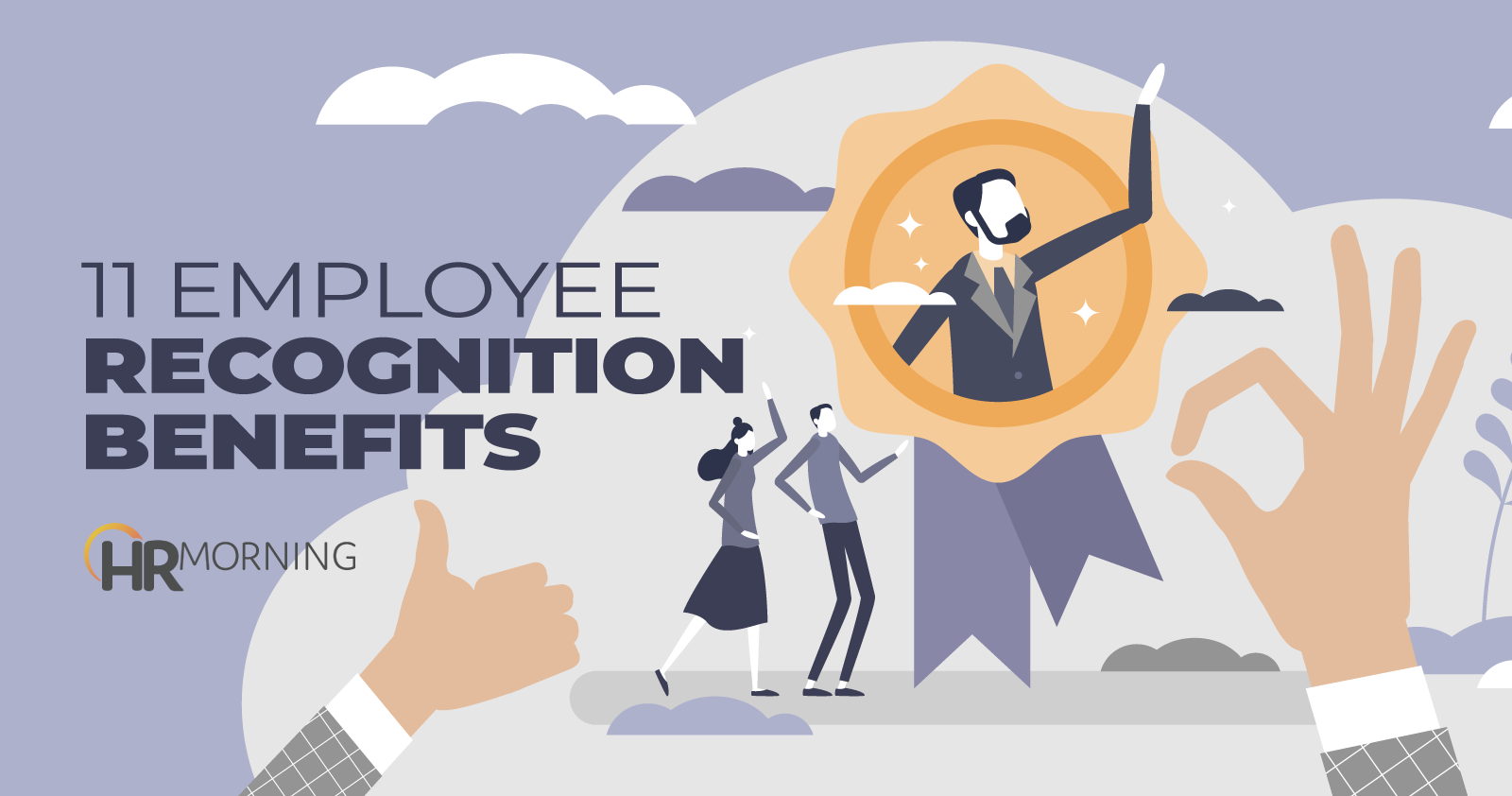Consistent employee recognition ensures the people who keep an organization running are always kept top-of-mind. Employees are the lifeblood of any business. If they’re unhappy or disengaged, the entire organization suffers. If a team is never recognized for their hard work, they may start to feel invisible – like nothing they do has any real impact.
This, of course, is not the case. So, it’s important to recognize your employees regularly and with sincerity. Our comprehensive guide will cover the benefits of employee recognition, what makes a successful recognition program, pitfalls to avoid and ideas to get you started.
What is employee recognition?
Employee recognition is the act of acknowledging and appreciating employees for their hard work and contribution to the organization. While it can take the form of a bonus or other rewards, what it really means is expressing authentic gratitude. When an employee does an excellent job it’s important to let them know, which, in turn, inspires and motivates them to go out and do it again.
Saying thank you and recognizing the effort of your employees makes the workplace more inclusive, welcoming, supportive and inspiring. It reminds everyone that they all share the same goals and are working as a team to achieve them. Employee recognition makes each individual feel like they’re a valuable part of the team – which they absolutely are!
Benefits of employee recognition
Employees aren’t just lemmings to be commanded at will; they’re real human beings with rich inner lives, goals and dreams for the future. Too often, workplaces neglect or conveniently forget this simple fact.
Recognizing the effort your team puts in has many benefits and is essential to employee engagement and retention, as well as the overall efficiency, effectiveness and well-being of the workplace.
Increases engagement

Recognizing the effort employees put in, as well as the impact they make on the business, enhances engagement. It makes each individual feel like they’re making valuable contributions to the company’s overall success. If an employee doesn’t feel like the work they put in matters, they’ll become disengaged and apathetic. Why apply themselves if nothing they do ever makes an impact?
Employee recognition lets your team know the work they’re doing has value. Employees are more engaged in their work because they can clearly identify where their effort has made a difference. They can easily point out their contributions and say, “I did that. That was me.” This leads to increased productivity and a buzzing, enthusiastic work environment where every team member is deeply engaged with the culture and goals of the company.
Inspires commitment

Showing your employees consistent appreciation demonstrates to each team member they’re an important part of the organization. When employees feel this way, it invites them to view their job and role as part of their identity. This inspires commitment to the organization, as employees are much less likely to leave a company they feel is a part of who they are as an individual.
Makes employees feel valued

Employee recognition shows team members the work they do matters. Human beings need to know the work they do has value. They need to know they’re making an important contribution – and this need supersedes monetary rewards.
Positive feedback and celebrating achievements make employees feel appreciated. It helps them feel like they’d be hard to replace; if they left their job, the company would be losing not only a vital asset but a friend. Their absence would be felt.
Aids company culture

Employee appreciation helps build a foundation of encouragement and enthusiasm, which promotes a positive company culture and fosters teamwork in the workplace. Support and cooperation are emphasized over competition, which helps to grow team morale rather than tear it down.
Teams won’t fear going to work, as the culture is an inclusive and supportive one. They’ll feel happy to work for your company, as opposed to dreading getting out of bed in the morning.
Encourages other team members

When team members see their fellow employees being recognized for their contributions, it encourages them to follow suit. Once other team members see recognition is possible, they’ll want it, too.
Fosters work pride

Recognizing an employee’s achievements makes them feel proud. They can pat themselves on the back and tell their family about the success they had at work. Employees’ confidence will grow, which will inspire and motivate them to invest more of themselves and their identity in their work.
Cultivating an employee’s sense of pride in their own success helps build team spirit and encourages further collaboration within the company.
Builds overall company reputation

Employees talk. If no one enjoys working for a company, it will pass swiftly through the grapevine and sour its reputation. Not only will employees talk about how bad the company is, but they’ll also become more apathetic and grumpier. A company may even lose customers and clients because who wants to deal with people who hate their job?
But if a company shows employees plenty of recognition and positive reinforcement, it’s a good thing they talk. People will hear about how great it is to work for that company, which will help attract top talent and maintain customer loyalty. Everyone will want to share in the positivity of the company culture.
Reduces turnover

Employee recognition programs improve employee retention, as disengaged and unhappy employees are a lot more likely to leave their jobs. People want to know that what they do has value. If a company doesn’t provide that, they’ll find it somewhere else. Considering the exorbitant cost of employee turnover, employee recognition is extremely beneficial to a business’s bottom line.
Provides a welcomed opportunity for feedback

Without feedback, employees don’t know if they’re coming or going. Am I doing this the right way? Is this the standard operating procedure or am I just slowing everything down? Will I bother my manager if I ask more questions? Will they think I’m stupid if I don’t get it?
Recognizing employees provides a perfect opportunity to share your feedback on their performance, so they can know what they’re doing well and what they can improve upon. Team members should never work in a vacuum. Feedback is essential to maintaining and optimizing employee performance, managers should take every opportunity to recognize and encourage their team.
Boosts productivity

When employees are more engaged, they’re more productive. When they take pride in their accomplishments, they’re more productive. Therefore, when employees are recognized, they’re more productive.
And keep in mind that people’s need for recognition isn’t just a one-and-done thing; human beings always want more. Recognition feels good. When we feel good, we want to keep feeling good. With consistent recognition, a team will continue to function to the best of its ability – because it feels good.
Effective employee recognition inspires employees to go the extra mile and strive for continuous improvement. They’ll remain engaged, enthusiastic and, above all, productive with regular encouragement and recognition.
Low-cost

A recognition strategy doesn’t need to be filled with expensive incentives or rewards to have a positive impact on the employee experience. Most recognition programs are relatively inexpensive and easy to implement, so they’re an ideal option for any company looking to enhance employee satisfaction and engagement.
What makes a successful employee recognition program?
A successful employee recognition program recognizes the contributions of employees and creates a positive environment in which they can thrive. The program must be well-designed, comprehensive and tailored to the needs of both individual employees and the organization as a whole.
Regular recognition opportunities
Recognition shouldn’t be reserved for special occasions and birthdays; regular, informal day-to-day recognition can help employees feel appreciated and motivated to continue doing their best work. Frequent recognition might consist of nothing more than an, “I appreciate the way you were able to relate to that customer, Samara!” or “Awesome job accounting for that potential roadblock, Carlos,” and so on.
On a slightly larger scale, staff recognition could include team lunches or social events, partial days off or small gifts, such as a local coffee shop gift card.
Managers can also make it a surprise. Throw a mini pizza party at lunch on Wednesday. Show up with coffee and donuts on a Tuesday morning out of the blue. Announce a cocktail hour on a Friday afternoon – which can work for in-person or remote teams. Sharing a celebratory drink (alcoholic or not) after a job well done is a great way to recognize everyone’s effort and celebrate the shared accomplishments.
Consistent feedback
Feedback is vital to cultivating a culture of growth and development – when it’s consistent. If feedback is only given sporadically, it won’t have the same effect. Getting called into a one-on-one meeting with your manager out of the blue doesn’t exactly inspire employee confidence – it inspires anxiety and automatically puts employees on the defensive. “What did I do wrong? Am I about to be chewed out?”
Consistent feedback ensures feedback is nothing to stress out about. It may include formal or informal reviews, regular check-ins with managers or coworkers. Frequent check-ins or one-on-one meetings with managers present opportunities to recognize employees for their hard work as well as assist with professional and personal development and goal setting.
Feedback is essential to growth, and if employees aren’t growing, they become stagnant. Managers should try and find regular opportunities for feedback as they strive to recognize their team.
Personalized rewards
Personalize your recognition program by getting to know each employee individually. What are their core values? What would they find rewarding? One employee may value time off with family above all other perks, whereas another employee may appreciate a small gift. Also, consider if team members want to be praised in front of the whole team, or if they’d prefer to receive their recognition in private. Social recognition isn’t for everyone.
Make recognition programs as effective as possible by tailoring the recognition to each employee’s personality traits and preferences.
Culture of recognition
Appreciating employees is about much more than gift cards and bonuses. Build recognition into the company culture by designing recognition programs that celebrate and encourage positivity, inclusivity, accountability and teamwork. Demonstrate to the team through actions that a job well done is a job well rewarded. Continue to build recognition into company culture by getting everyone involved, from employees to managers to executives.
Ask questions, evolve and improve
How can employers tell if their recognition program is working? It’s as easy as asking questions and gathering feedback from their team members. No matter how management feels about the program, employees are the real barometer for whether a recognition program is successful.
What’s working? What would employees like to see more or less of? Do they feel valued in their role? Employee surveys can provide clear metrics, as well as a baseline before a new program is launched. Other metrics that can help monitor success and identify where to improve include employee turnover rates, increased or decreased interest in new job openings, meeting participation and one-on-one meeting feedback.
Use everything learned to evolve the program and improve. If something isn’t working, don’t force it. Make changes along the way and as you learn what your employees really want.
Watch out for employee recognition pitfalls

When run poorly, recognition programs can center out people who don’t want to be centered out and overload team members with gifts they don’t need. Here are some common mistakes to avoid and what to do instead:
- Move beyond monetary rewards. Save the money for bonuses; instead, come up with thoughtful ways of recognizing employees, even if it’s a simple shoutout at your next all-hands meeting.
- Don’t call attention to an employee during a meeting or in a public space if it’s not their preference. Some people crave public recognition, but others are horrified by it.
- Recognize team members beyond special occasions. For recognition to be effective, it can’t be expected.
- Recognizing the same people repeatedly is boring and will make other people feel left out. Recognition programs work best when a variety of team members are recognized for different reasons.
- A lack of variety will make for a bland program, and it could lead to everyone receiving the same or similar recognition. Instead, strive to personalize the recognition to each team member.
Employee recognition examples
Different types of achievements will result in different types of recognition. Some recognition is small, whereas other larger accomplishments deserve to be recognized formally.
Above-and-beyond recognition
Above-and-beyond recognition can be for big moments when an employee saves the day or for smaller but consistent achievements like when an employee continually goes out of their way to help their peers or someone always puts the coffee on for everyone else in the morning.
In-the-moment recognition
In-the-moment recognition is often small, but it doesn’t wait for a specific opportunity or moment – it happens in real-time. You might give recognition in passing at the office, in a Slack message or immediately after a job well done. This type of recognition could be between peers, managers, executives and so on.
Top-down recognition
Being recognized by important executive members of the team who may not regularly interact with certain employees can have a profound effect on morale. Team members will feel valued and empowered to go above and beyond, and to continue displaying company values in the hope of receiving more of this attention from senior leaders.
Direct report recognition
Direct report recognition comes from supervisors or managers and is essential to building rapport. Ideally, recognition will occur regularly during one-on-one meetings as employees meet goals, develop professionally, or help the team in a significant way. For significant achievements, managers may choose to recognize employees outside of the one-on-one meeting setting.
Peer recognition
Peer-to-peer recognition builds trust and team camaraderie. Build a recognition program that encourages everyone to participate and support each other’s accomplishments.
Service recognition
Service recognition recognizes work anniversaries, tenure, milestones or years of service, and it’s often a more formal recognition type. The key here is to keep it linked to company culture and to always ensure it’s something people really want – no more $500 paperweights!
Employee recognition ideas

Recognition programs can take on all different shapes and sizes, and the type of recognition program chosen will depend on the available resources, the size of the team and the needs of the team.
Here are some ideas to consider:
- Send small kudos in the moment to recognize small achievements on a daily basis. This can be as simple as saying thanks for cleaning up after lunch or congratulating someone on reaching a small milestone.
- Offer small gestures of appreciation, such as surprise treats, handwritten thank you notes or allowing the team to leave a little early. Little things go a long way in increasing team morale.
- Organize team-building activities to reward employees, such as office happy hours, group lunches or learning opportunities. These events have the bonus effect of building camaraderie among employees and improving workplace relationships.
- Offer opportunities for career development, such as team training, tuition reimbursement or education budgets. Help employees feel like they’re able to grow where they are so they don’t look for opportunities elsewhere.
- Start an awards program that recognizes employees who reach their goals, and go above and beyond to help their team and the company thrive. This might be awarded weekly, monthly or quarterly depending on the size of the team.
- Provide unique perks to recognize individual employees or the whole team. Think outside the box. Maybe it’s an extra day off work, extended lunch breaks, an in-office masseuse, a bottle of wine, tea or coffee delivered to remote employees, free healthy snacks in the office or a bonus that can go toward any wellness activity.
Looking for more specific ideas? Here are 19 ideas to build a better employee recognition program.
Embedding recognition into company culture
Ultimately, a successful employee recognition program should help employees feel valued and appreciated for their work while also helping to drive improved performance and engagement within the organization. With careful planning and continuous feedback, organizations can create recognition programs that motivate, inspire and delight all team members.
Remember that any successful recognition program focuses on what a team wants, not what the company thinks they want. Continue to ask questions and learn more about team members on a personal level. This allows employers to design a recognition program suited to their individual needs.
What’s so special about recognition is that it doesn’t need to cost much at all. A simple “Thank you” or “Great work this week” can go a long way toward building rapport and improving team-wide morale.
The next time you think your team member or direct report did a great job, go ahead and tell them!


